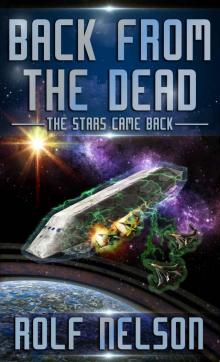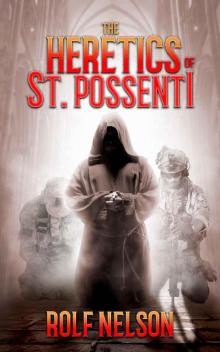- Home
- Rolf Nelson
The Heretics of St. Possenti Page 5
The Heretics of St. Possenti Read online
Page 5
All were vets who had been discharged for psych issues after they’d been dumped in the meat-grinder of one ’Stan after another before getting transferred to Africa, denied initial discharge dates, and eventually required to sign nondisclosure agreements to get out after doing things they would only obliquely allude to, but that they implied—and their expressions and body-language corroborated—were horrible. In order to get VA treatment, they were required to sign documents admitting that they were unstable and a danger to themselves and others, which caused jobs to evaporate and wives and kids to run. Divorce attorneys and judges were not exactly kind to them, in words or decisions. One judge went so far as to say Timothy had gotten no more than he deserved for volunteering to go to murder brown people before he awarded Timothy’s now-former wife everything but the debts.
They couldn’t own guns to protect themselves, couldn’t get new jobs because of background check requirements, and couldn’t get into most treatment programs because they had not actually abused drugs or alcohol to any significant degree. The simple fact that they’d managed to avoid drugs, prescription or otherwise, was actually held against them; it was “proof” they didn’t have any “real” problems.
The fourth vet Thomas had expected to meet was dead. He had stepped in front of a fast-moving late-night express bus two days prior, and it was unclear whether this was a deliberate act or a tragic accident. He had been acting very distracted lately, talking about not being able to continue to fight his “nonexistent” problems any longer. His funeral was tomorrow.
It wasn’t the first time these men had heard such news. The youngest of the three said in a cracking voice, “The sad part is, even though we’re used to losing squad-mates, there always seems to be an endless supply of new ones for us to avoid sharing war-stories with.” They sat in silence, sipping coffee, for a long while after that.
Bishop Thomas Cranberry was unable to find the right words to say when comforting the grieving. His normal pat phrases seemed trite and hollow, inadequate, if not disrespectful. When he finally spoke, it was to ask where and when the service was, so he could pay his respects and offer a small prayer for the fallen.
* * *
It was a somber bishop who walked home after an emotionally draining day, and he didn’t sleep much that night. He was tired, with circles under his eyes, and no appetite all morning. When he left for the funeral, he wore nothing denoting his position save his collar. The service was a simple one at the crematorium where the remains were to be interred, with fewer than a dozen people in attendance. No family members were present. Timothy briefly introduced Thomas to the people he had not met (most were rather rough-looking military veterans), and Thomas already knew the retired chaplain conducting the ceremony.
As a veteran, Orlando Garcia—once a buff and handsome 28-year old, more recently a haunted-looking 120-pound specter—could have received a military funeral, but his final wishes were clear: “keep them that killed me and my family the hell away from me”, with Frank Bunt, the retired army chaplain-cum VA counselor being the only exception. He asked for cremation, and that the few people who still understood him would raise a toast to his name from time to time, so long as they remembered him.
The eulogies were mostly terse, but personal. Some related brief stories about something the deceased had said or done: he had always appeared to be a solid, serious sort, and that made the occasional prank he pulled off so much more unexpected. Garcia had been engaged before enlistment, but he lost her just like he’d lost his health from too much time overseas. He was honest and did the best he could with what he had. He liked country-Mex music and could play the harmonica. He had received four Purple Hearts, two Bronze Stars, and a Legion of Merit, but he was proudest of never breaking his word.
When the chaplain asked if he would like to say a few words, Thomas nodded, stepped forward, and drew a complete blank for the first time in his life. It was the first funeral since graduation from seminary that was not attending in some official capacity. He had no personal connection to the man and, in fact, had never met him. What little he knew of Orlando Garcia was from talking with Timothy and his two friends the day before and listening here.
“Deus animae tuae misereatur,” he began, to get his mouth and mind working. “The plan of God for each of us is not always clear. It may seem at times that He has forsaken us completely. But like a pebble in a pond, the ripples of each life we touch spread outward, finally breaking on even the farthest shore. Orlando meant something to each of you, and now I, too, am here. His life, and death, shall not be lost, forgotten, and discarded in the scrap-heap of history. Let each of you walk from here knowing he helped you make it this far. May his short life inspire others to find a way to prevent such lives being lost so young. In Nomine Patris, et Filii, et Spiritus Sancti. Amen.”
Dojo II
Faith has to do with things that are not seen and hope with things that are not at hand.
—Thomas Aquinas
The rest of his time at the funeral was a bit of a blur. He vaguely remembered shaking hands with the other attendees and promising to contact the chaplain at some unspecified future date. He walked out and started toward home. The wind chilling him to his core seemed a small price to feel the pain of the world these cast-off men experienced every day.
He didn’t go home. He ended up at the dojo instead, where he just sat and watched, his mental disconnectedness fading as his physical numbness subsided in the relative heat indoors.
Six students were being led by one of the instructors in a formal, stylized series of moves while John coached another in an individual practice of attack and defense. Everyone else was working out with the weights. It was less exciting than his first time here, but just as foreign. John saw Thomas, gave the faintest of acknowledgments, and continued without interrupting his lesson.
When the clock struck the hour, several people changed their activities as scheduled, some continued as before, and a few took a break, including John’s student. John walked over to his unexpected visitor, and the bishop rose to meet him. Noting the blank expression on Cranberry’s face, John’s greeting was a neutral-sounding, “Afternoon. What’s up?”
“I have just come from Orlando’s funeral service. There were not many people there.”
“Oh. I hadn’t heard. Can’t say I’m surprised… He was going downhill fast. Thank you for going. He used to be Catholic.”
“Orlando sounded like someone I would have liked to know.”
“Yeah. Nice guy, but quiet. Serious. Serious flashback problems. He was afraid he’d hurt his family—fiancée and kid—thinking they were bogies. He ran from them to keep them safe.”
They stood in silence for a moment.
“I always find a good workout makes me feel better when my mind is messed up,” offered John. “You get your first workout for free. I’m sure I can find a spotter to help you out, show you the basics, and make sure you don’t get hurt.”
“Oh, no, that is really not my way. And I’m not exactly dressed for–”
“Don’t worry about that. Got some loaner gis and sweats in the back.” Thomas floundered, looking for a plausible excuse to beg off, but came up empty. He had no meetings to attend, no injuries healing, no appointments, no job schedule to keep, no honey-do lists, no family waiting in the car.
“I suppose this is a good day to let His fate work its way. Where do I change?”
“That’s the spirit! Right back that way,” said John with a big grin. “I promise he’ll go easy on you.”
* * *
A few minutes later, dressed in sweats with no collar and feeling very self-conscious, the priest was back out in the dojo being shown around the strength-training area of the hall, where there were free weights, rings, bars, balls, and various other apparatuses. John assigned Deverick, his 15-year-old homeschooled nephew who worked at the dojo part time, to give him a proper introduction to everything and to explain what each thing was, how it worke
d, and what muscles it was best for. Deverick demonstrated each technique briefly and watched Thomas give each one a try while using very modest weights to ensure minimal risk of injury… and to ensure he could get through them all before he wore out.
It quickly became almost embarrassingly clear to Thomas that he was totally out of shape, but his young mentor offered him nothing but encouragement and praise of form and effort, without sounding snarky or condescending. He was very unlike most teen boys he met at church or elsewhere.
When he was done, his whole body was shaking, as much from mental fatigue as physical. He’d not done that much physical work at one time in years, if ever, and constantly thinking about technique, muscle names, machine names, exercise names, and the rest left him exhausted and sweating. John came up behind him while he was drinking thirstily from the water fountain (We don’t do vending machines or bottled water, they said). “Ah, getting ready for a brisk hour of cardio?” he joked. Thomas nearly snorted water out his nose before he stood up, shaking his head.
“No, thank you. I will pass on that today. You sure know how to make a man feel out of it, you know? By the time we got to the military press, I could barely do it with only the bar.” He stretched his shoulder, rubbing it carefully. “I am going to be sore tomorrow.”
“Drink a lot of water, get a massage, take an Epsom salt bath, and go to bed early. Make you feel like a million bucks day after tomorrow and darn happy you came here. But tomorrow you will be sore no matter what you do.”
“I have never had a massage. I’m rather reluctant to try such a sensual thing, to be honest, given my position, even in my current condition.”
“Sensual?” John snorted. “Trust me. You’ll never think of a serious sports massage as ‘sensual’ after a hard workout. The masseuse might need to wear earplugs. We can see if a slot’s available in a few minutes. So talk to me. What did you learn? About yourself, about the equipment, about exercise?” His demeanor was friendly, engaging, and enthusiastic, but not pushy or insincere; the perfect sort of approach to get someone to talk openly.
“It has been a long time since I have felt so humbled before anything but the Lord.”
“Yeah, you looked pretty craptacular with some of those poses. A quarter of regular coaching and hard exercise would do you a world of good. Better posture, more energy, sleep better, balance better, keep those extra few pounds that always creep up on guys of a certain age from jumping on any earlier than they have to.”
“Perhaps.” He flexed his hands, massaging his forearm. “But not this moment. I feel like I couldn’t pick up a teacup.”
“All the more reason for you to come here regularly.”
“Deverick certainly wasn’t having any problems with them, and he weighs a lot less than I do.”
“He’s all but lived here for the last ten years. He studies in back a lot. Gets tutored in subjects my brother doesn’t know by a bunch of different people in exchange for discounts on group lessons. Vritra is teaching him a bit of refrigeration and heat transfer right now. Deverick hangs out here, sucking up information like a sponge, doing pushups when he gets a math problem wrong. Average smart, but rock steady and reliable. Joe—Joseph, my brother—picks him up on the way home. Doesn’t like the public schools around here, so we worked out a deal. A pretty good one by my accounting.”
“That’s legal?”
“Technically. We’re family. And don’t tell anyone, but I’ve got a degree in literature and a minor in psychology, so I can help him on those subjects for fun.”
Thomas raised an eyebrow in surprise. John didn’t exactly look the type.
“Couldn’t get a job in the field, a little too outspoken about calling BS on BS. So here I am. Money’s not very good, but the hours are okay, and the clientele and coworkers are a whole lot less messed up.”
“Less?”
“Absolutely. You can beat a sense of reality into someone in here. Delusions are stripped away with great abandon. Some little prince walks through that door having been told he’s the whitest and most precious snowflake ever to fall from the heavens, and he promptly finds out that his opponent’s fist disagrees most emphatically. They catch the clue-by-four very quickly. As you yourself said, you are humbled. And that was just the weights. By a 15-year-old. A nice one, doing his best to be helpful.”
Thomas had to agree.
“So I get some free help in exchange for tutoring, I get more customers and connections, meet people with all sorts of skills and knowledge, so a lot of things can happen off-book to keep expenses and taxable cash flow down.”
“It sounds… shady.”
“It’s what you have to do to stay in business. I follow the letter of the law very closely. A half dozen of my regulars are cops, so I know who to ask to find out exactly what landmines I have to watch for. I hire only family, and it’s set up under the law so that as long as I hire only family, none of the normal job-hiring requirements like quotas based on skin color or reproductive equipment apply, only competence. I mean, could you do everything you do if you had to account for donations as taxable income and had to hire as many gal-priests as guys or be sued for sex discrimination?”
“No, of course not. That’s absurd.”
John shrugged, spreading his palms up. “C’est la vie. We all do what we must.”
“I suppose.”
“So, Father, will I be seeing you regularly? Got a lot of sinners here for you to meet, and the workouts may be needed more than you’d like to admit.”
“Likely so. But no promises.” He wearily massaged his still aching forearms. “How long will they feel like this?”
“Depends on what you do next. It’s all about choices. How do you want to feel?”
* * *
A half-hour later, Bishop Cranberry had more phone numbers, the outline of an exercise and stretching program, some dietary recommendations he had never before considered, an open invitation to return, and a rapidly stiffening back that was telling him without subtlety that the ice, ibuprofen, and massage recommendations were good ones.
Routine Changes
Beyond any question, the way the American founders consistently linked faith and freedom, republicanism and religion, was not only deliberate and thoughtful, it was also surprising and anything but routine.
—Os Guinness
Over the next month, the comfortable routine that had ruled Thomas’s life for over a decade was upended. He discovered the rush of an adrenaline high of striking a bag, the uniquely deep sleep of exhaustion from a hard workout, a multitude of new foods, the increased energy from better blood flow and increasing muscle mass, the wonder of a decreasing beltline, and a thousand small ways a body could hurt in a very satisfying way.
He’d met a much wider variety of people than he ever would have imagined he would—people from an entirely different world than he ordinarily swam in. He spent many hours talking with VA counselors, substance abuse specialists of the psychological and medical varieties, street people, and regulars at the dojo, library, shelters, and the pub. When having a sandwich at the Howling Puffin, he even experienced the surprise of a moderately respectable-looking representative of the female of the species making a pass at him after he had struck up a conversation with her as he had so many others recently, to the uproarious amusement of his new circle of friends and acquaintances. In fact, his shock when Erika pointed out to him sotto voce what was happening was downright comical and hilarious to the woman involved after she got over her own initial embarrassment at her priestly pass. He’d seen a few ladies try to seduce priests before, the “forbidden fruit” syndrome, but this was more an honest mistake.
He also found that Erika’s assessment of why people were there was tragically accurate. The vets he met almost all had one of a small set of monotonously infuriating scripts that had seemed to lay out their lives, with only minor variations in where they’d been posted, how they been screwed over by nearly everyone, how they’d lost family, jobs,
or friends, and how bleak they thought their prospects were.
They almost made the attempted suicide he’d witnessed in the pews the previous month make sense. Well, understandable, at least. Replaying in his mind what the man had said in his final rambling monologue, he pieced together the tragic trajectory his life had taken since graduating as the valedictorian of his small rural high school and joining the Army. Recruited with the lure of college money, he was the only man in his Stryker squad to survive when it was obliterated by an old Russian antitank mine in eastern Sudan. That had happened less than a month after his unit was transferred from Tajikistan, where he been one of only three remaining soldiers from his original squad sent in 18 months before as part of an international peacekeeping force. He was used up on too many overseas deployments, surplussed as damaged government property, given the runaround on treatment, abandoned by family, only finding solace in drugs and alcohol to try to drown his flashbacks of comrades in arms dying, burned alive in flames from a homemade bomb, and being wracked with survivor’s guilt.
Thomas was amazed how high and how low he could be in a single day, and the amount of time he spent in actual life-and-death prayer for specific people increased dramatically, too. The people he now met had issues that made his normal parishioner’s troubles appear trite and trivial. They had problems that even started to put his own faith to the test. But although he made many new friends and acquaintances, he wasn’t making any converts. While most people didn’t say they minded his prayers and admitted to being nominally Christian, they were distressingly uniform in their certainty the Church offered them nothing worth the time and money they knew they would be asked to invest.

 Insanity's Children
Insanity's Children The Stars Came Back
The Stars Came Back Back From the Dead
Back From the Dead The Heretics of St. Possenti
The Heretics of St. Possenti